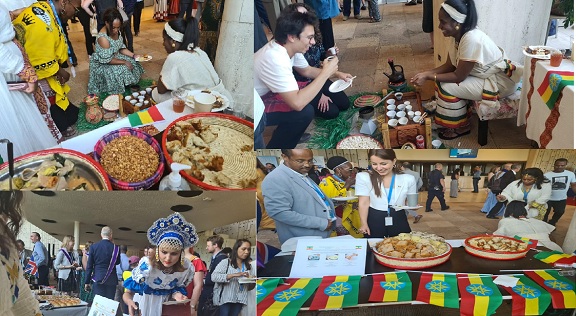
BY STAFF REPORTER
“On my recent trip to Ethiopia, I was surprised to find that Ethiopian cuisine – much like other aspects of Ethiopian culture – is one of the most unique and diverse cuisines in the world. (The only country that shares a similar cuisine is neighboring Eritrea.), wrote Nellie Huang, Singaporean a professional travel blogger.
“In Ethiopia, she continued, it is easy to find rich, flavorful curries and a diverse selection of foods almost everywhere you go-whether in simple rural villages or restaurants in the big cities. I feaster on possibly the best curry I have ever had in tiny village in the middle of Ethiopia.”
As she witnessed, food in Ethiopia is exciting and different; there is never a dull moment when it comes to Ethiopian food. With strong, spicy flavors and rich stews, Ethiopia’s traditional food definitely ranks as one of her favorite cuisines in the world.
“When you eat Ethiopian food, you’re enjoying a cuisine whose origins probably date back to the middle of the first millennium A.D, wrote Harry Kloman, the other tourist who was served with varieties of Ethiopia’s dishes.
In his piece entitled, ‘Get to Know Comforting Ethiopian Cuisine’, Harry said that many cultures eat their cuisine with their hands, but at the Ethiopian table, there is a twist: You might just find yourself eating from someone else’s hand. It is a ritual called gursha, whereby you reach across the table to place a piece of food-filled injera into the mouth of a friend, and then, your friend does the same in return. That is another good reason to wash your hands before a traditional Ethiopian meal.
CNN in its accounts also expressed Ethiopia’s’ food as a distinctive and delicious, befitting a remarkable country with a cultural heritage that stands out from the rest of Africa.
While the cuisine of Ethiopia is gradually becoming better known, it is no overstatement to say it remains one of the world’s best-kept secrets. Most Ethiopian dishes are nutrient-dense and low in fat, it remarked.
“Beyond the endless dishes on offer, it is essential to try Ethiopian coffee after a meal. Ethiopia is reportedly the birthplace of quality Arabica coffee, and its coffees are widely praised as some of the best in the world,” as to CNN.
True, Ethiopians have unique cultural dishes which are rich and flavorful. Aside from the delicious meals, Ethiopia’s coffee and Tej (a homemade alcoholic drink prepared from honey are things which remain unique in the world and Ethiopians take greater pride.
Recently, at the annual festival – the United Nations National Dress and Gastronomy Day- a Multicultural Party organized on the margins of the 50th session of the Human Rights Council, and in which various countries participated and presented their cultural gastronomies, Ethiopians also displayed their unique dishes.
At the program, took place last Friday (June 17, 2022) at the United Nations Serpentine bar in Palais des Nations in Geneva, Switzerland, under the Motto: “All equal, all human, all dressed up”, Ethiopia’s national food and drink received appreciation by visitors.
As Ministry of Foreign Affairs (MoFA) reported, during the event, Ethiopia´s gastronomy stall was graced by the presence of Amb. Zenebe Kebede, Permanent Representative of Ethiopia to the United Nations and other International Organizations in Geneva, Amb. Mahlet Hailu, Deputy Permanent Representative of Ethiopia to the United Nations and other international organizations in Geneva, and other diplomats, who work in the mission and adorned with Ethiopian cultural traditional dresses.
Ethiopian gastronomy exhibited on the booth includes Ethiopian coffee entire ceremony, ´Injera´ with ´Miser´, ´Atter´, Lettuce, and ´Shiro wat.´ Dough bread, ´Gebes kollo´(roasted barely) and popcorn were also put on a display.
Visitors and participants who were served with Ethiopian gastronomy were highly impressed by the delicious taste of the meals and expressed their appreciation.
More than thirty-nine countries, including Ethiopia, participated and promoted their cultural foods and/or drinks and played their part in the event´s success.
The event was honored by the presence of more than a thousand visitors and participants, including ambassadors, UN staff, seasoned diplomats, academicians, artists, and other renowned people residing in Geneva. Ethiopia’s dishes were among the top-visited and tasted ones at the event, reported MoFA.
Gastronomy is the style of cooking in a particular region and a cultural expression of the world’s natural and cultural diversity.
Sustainable Gastronomy Day was established by the United Nations after the United Nations General Assembly adopted the resolution A/RES/71/246 on December 21, 2016. And Sustainable Gastronomy Day, which takes place on June 18 every year, is a special holiday that is dedicated to sustainable cuisine that promotes food security, agricultural development, sustainable food production, nutrition, and the conservation of biodiversity.
First observed on June 18, 2017, Sustainable Gastronomy Day is a day that ensures each culture and civilization are contributors and crucial enablers of sustainable development throughout the planet.
On this Sustainable Gastronomy Day, the United Nations Educational, Scientific and Cultural Organization (UNESCO) and the Food and Agricultural Organization (FAO), as well as the U.N. General Assembly will work to raise awareness about sustainable gastronomical practices. They do this through T.V. food channels and gastronomy shows, and through food cultural exhibitions, intended for the food industry and farmers.
Thus, sustainable gastronomy is linked with the three dimensions of sustainable development and can achieve the sustainable development goals by promoting agricultural development, nutrition, food production, and the conservation of biodiversity.
The Ethiopian Herald June 24/2022





